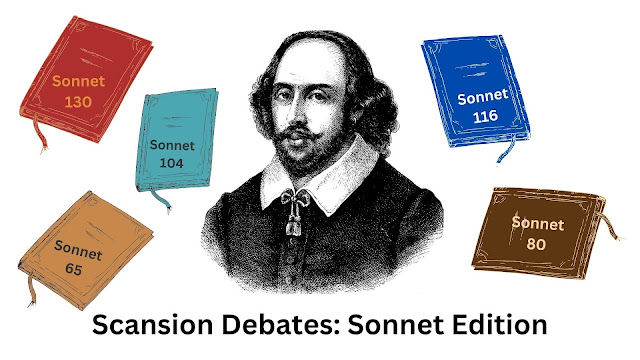The GEB is back with a sequel to our popular post, Scansion Debates of Shakespeare's Famous Lines. In that post, we took 5 different lines from 5 different plays and presented and analyzed ways to scan them. Now, let's do the same with the sonnets.
The sonnet is printed in its entirety. Below are the scansion options: stressed syllables are marked in bold and underlined, while unstressed syllables appear in plain type. Differences from the previous scansion are highlighted in yellow.
1. "As any she belied with false compare." (Sonnet 130)
My mistress' eyes are nothing like the sun;
Coral is far more red than her lips' red;
If snow be white, why then her breasts are dun;
If hairs be wires, black wires grow on her head.
I have seen roses damasked, red and white,
But no such roses see I in her cheeks;
And in some perfumes is there more delight
Than in the breath that from my mistress reeks.
I love to hear her speak, yet well I know
That music hath a far more pleasing sound;
I grant I never saw a goddess go;
My mistress, when she walks, treads on the ground.
And yet, by heaven, I think my love as rare
As any she belied with false compare.
Scansion #1: As any she belied with false compare
The first scansion uses straight iambs. The key here is the emphasis on "she". With that stress, "she belied" is an object-verb (not a subject-verb) construction. The "she" is the one being falsely described, not the one doing the describing.
Scansion #2: As any she belied with false compare
If we take away the stress on the "she", the mistress becomes the subject of the verb "belied." The "she" here is not some other girl about whom flattering sonnets are written; here, "she" is the "mistress" herself. And the mistress is the one doing the describing––not the one described. Grammatically, this is a little more awkward than the interpretation that goes along with the first scansion.
Patrick Stewart does not choose to stress "she" in his Sonnet-A-Day videos from 2020; watch his reading of Sonnet 130
here.
Note on these two scansions
These two scansions have a significant impact on the final couplet: the way you scan the last line (Line 14) also changes the meaning of the second to last line (Line 13). This is pretty rare––and pretty cool. In Scansion #1, "my love" means the beloved (the mistress). In Scansion #2, "my love" is the feeling of love that the narrator has for his beloved.
2. "Let me not to the marriage of true minds" (Sonnet 116)
Let me not to the marriage of true minds
Admit impediments. Love is not love
Which alters when it alteration finds,
Or bends with the remover to remove.
O no! It is an ever-fixed mark
That looks on tempests and is never shaken;
It is the start to every wand'ring bark,
Whose worth's unknown, although his height be taken.
Love's not Time's fool, though rosy lips and cheeks
Within his bending sickle's compass come;
Love alters not with his brief hours and weeks,
But bears it out even to the edge of doom.
If this be error and upon me prov'd,
I never writ, nor no man ever lov'd.
Scansion #1: Let me not to the marriage of true minds
This scansion is mostly iambic. A quick note: the decision of whether or not to stress words like "to" or "of" often depends on the actor. Here, we have not marked them as stressed for ease of viewing. In this interpretation, the focus is on "me"––the narrator is the one who remains in love with his beloved.
Scansion #2: Let me not to the marriage of true minds
This scansion makes the line sound like more of an exclamation or plea (on the same lines as a very dramatic "O let me never...!"). The focus is not on the speaker, but on the desire to remain in love with his beloved as time passes.
Scansion #3: scansion #1 or #2 + additional stress on true
Let me not to the marriage of true minds
Let me not to the marriage of true minds
Choosing to stress "true" foregrounds the feelings that the narrator and his beloved have for one another. The exact meaning of the phrase is a little enigmatic––what are "true minds"? Well-matched people? Honest people? People truly in love? No matter the interpretation, we can tell that this is not an ordinary relationship. And that's the reason for the rest of the sonnet: because they are "true minds," the narrator will not fall out of love with his beloved.
3. "For fear of which, hear this, thou age unbred:" (Sonnet 104)
To me, fair friend, you never can be old,
For as you were when first your eye I eyed,
Such seems your beauty still. Three winters cold
Have from the forests shook three summers' pride,
Three beauteous springs to yellow autumn turned
In process of the seasons have I seen,
Three April perfumes in three hot Junes burned,
Since first I saw you fresh, which yet are green.
Ah, yet doth beauty, like a dial-hand,
Steal from his figure, and no pace perceived;
So your sweet hue, which methinks still doth stand,
Hath motion, and mine eye may be deceived:
For fear of which, hear this, thou age unbred:
Ere you were born was beauty's summer dead.
Scansion #1: For fear of which, hear this, thou age unbred
This scansion is straight iambs––traditional, but clear. The emphasis of "hear this" draws our attention to the thing the narrator is about to say.
Scansion #2: For fear of which, hear this, thou age unbred
This scansion replaces the iamb from scansion #1 with a trochee: in "hear this," the emphasis is on "hear." This new stress turns the line into more of a call-out or a call-to-action.
4. "Shall time's best jewel from time's chest lie hid?" (Sonnet 65)
Since brass, nor stone, nor earth, nor boundless sea
But sad mortality o'er-sways their power,
How with this rage shall beauty hold a plea,
Whose action is no stronger than a flower?
O, how shall summer's honey breath hold out
Against the wrackful siege of batt'ring days,
When rocks impregnable are not so stout,
Nor gates of steel so strong, but time decays?
O fearful meditation! where, alack,
Shall time's best jewel from time's chest lie hid?
Or what strong hand can hold his swift foot back?
Or who his spoil of beauty can forbid?
O, none, unless this miracle have might,
That in black ink my love may still shine bright.
Scansion #1: Shall time's best jewel from time's chest lie hid?
This first option is a straight iamb reading of the line. While very clear, it may not sound quite as natural as some of the other choices. As previously mentioned, many actors consider it awkward to place stress on words like "from," so it is not marked here.
Scansion #2: Shall time's best jewel from time's chest lie hid?
When you start digging into variations, this line proves tricky to scan. This scansion has two main advantages: it keeps the average of 5 stressed syllables per line while still sounding natural. It emphasizes "time"––the theme of the line––along with the two important images of the line, "jewel" and "chest."
Scansion #3: scansions #1 or #2 + additional stress on best
Shall time's best jewel from time's chest lie hid?
Shall time's best jewel from time's chest lie hid?
This last pair of scansion options stresses "best" to prove that the narrator's beloved is supremely beautiful. However, it make this line rather intense––6 stresses out of 10 syllables. That certainly packs a punch!
5. "But since your worth, wide as the ocean is" (Sonnet 80)
O, how I faint when I of you do write,
Knowing a better spirit doth use your name,
And in the praise thereof spends all his might,
To make me tongue-tied speaking of your fame.
But since your worth, wide as the ocean is,
The humble as the proudest sail doth bear,
My saucy bark, inferior* far to his,
On your broad main doth willfully appear.
Your shallowest help will hold me up afloat
Whilst he upon your soundless deep doth ride,
Or, being wracked, I am a worthless boat,
He of tall building and of goodly pride.
Then, if he thrive and I be cast away,
The worst was this: my love was my decay.
*Note: read with three syllables, as "in-fer-ior"
Scansion #1: But since your worth, wide as the ocean is
Scanning this line as straight iambs does not quite work: stressing "as" instead of "wide" is awkward. This scansion maintains the average 5 stresses per line and sounds natural.
Scansion #2: But since your worth, wide as the ocean is
This scansion makes "your worth" into a trochee, rather than an iamb. The advantage here is that placing the stress on "your" foregrounds the beloved, who is––of course––the subject of the poem. It also unlocks the emotions of the sonnet, which can give an actor more to work with. But this scansion also has a drawback: the double stress on "since your," along with the double trochee of "your worth, wide as" sounds a little unnatural.





My feeling has always been that the Sonnets should not be read/interpreted in some stentorian, slow, deep voice but quickly and with youthful (hormonal) guy energy. My assumption is that is the mind's voice that accompanied there writing/editing/etc.
ReplyDeleteAll speculation, but they work better with that kind of reading, to me.
I am gob-smacked by the Sonnets, but also find them young dude weird and some of the worst "love" sentiments ever. Highly narcissistic with a central theme of "You owe me." Like a hormonal, teen accountant POV.
But also brilliant in their narrowness and unloving qualities. Worst pick up lines ever!
Wish they, and Will's (and Marlowe's Jonson's, Barnfield's) poems would get more attention.